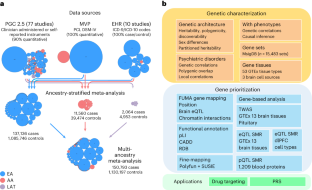2024-04-19 カリフォルニア大学サンディエゴ校(UCSD)
<関連情報>
- https://today.ucsd.edu/story/breakthrough-study-on-post-traumatic-stress-disorder
- https://www.nature.com/articles/s41588-024-01707-9
ゲノムワイド関連解析により95のリスク遺伝子座が同定され、心的外傷後ストレス障害の神経生物学への洞察が得られた Genome-wide association analyses identify 95 risk loci and provide insights into the neurobiology of post-traumatic stress disorder
Caroline M. Nievergelt,Adam X. Maihofer,Elizabeth G. Atkinson,Chia-Yen Chen,Karmel W. Choi,Jonathan R. I. Coleman,Nikolaos P. Daskalakis,Laramie E. Duncan,Renato Polimanti,Cindy Aaronson,Ananda B. Amstadter,Soren B. Andersen,Ole A. Andreassen,Paul A. Arbisi,Allison E. Ashley-Koch,S. Bryn Austin,Esmina Avdibegoviç,Dragan Babić,Silviu-Alin Bacanu,Dewleen G. Baker,Anthony Batzler,Jean C. Beckham,Sintia Belangero,Corina Benjet,AURORA Study,Estonian Biobank Research Team,FinnGen Investigators,HUNT All-In Psychiatry,… Karestan C. Koenen
Nature Genetics Published:18 April 2024
DOI:https://doi.org/10.1038/s41588-024-01707-9

Abstract
Post-traumatic stress disorder (PTSD) genetics are characterized by lower discoverability than most other psychiatric disorders. The contribution to biological understanding from previous genetic studies has thus been limited. We performed a multi-ancestry meta-analysis of genome-wide association studies across 1,222,882 individuals of European ancestry (137,136 cases) and 58,051 admixed individuals with African and Native American ancestry (13,624 cases). We identified 95 genome-wide significant loci (80 new). Convergent multi-omic approaches identified 43 potential causal genes, broadly classified as neurotransmitter and ion channel synaptic modulators (for example, GRIA1, GRM8 and CACNA1E), developmental, axon guidance and transcription factors (for example, FOXP2, EFNA5 and DCC), synaptic structure and function genes (for example, PCLO, NCAM1 and PDE4B) and endocrine or immune regulators (for example, ESR1, TRAF3 and TANK). Additional top genes influence stress, immune, fear and threat-related processes, previously hypothesized to underlie PTSD neurobiology. These findings strengthen our understanding of neurobiological systems relevant to PTSD pathophysiology, while also opening new areas for investigation.


